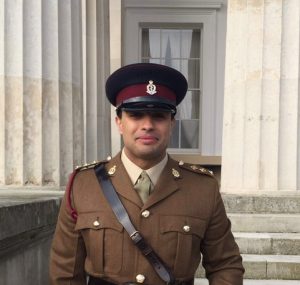Health Professional Researchers (HPRs) at King’s include medical doctors, dentists, nurses, clinical psychologists, psychiatrists, and members of the 14 allied health professions as outlined on this NHS England webpage, who are also currently engaged in a period of research training.
HPRs are also sometimes known as Clinical Academic Researchers, and this and related terms can refer to pre-doctoral, doctoral, and post-doctoral researchers on a clinical academic pathway at King’s.
In this blog post we introduce you to one of our Health Professional Researchers at King’s, Captain Lawen Karim MRCS:
- Lawen is in the second year of his PhD and is currently funded by a Guy’s and St Thomas’ Biomedical Research Centre (BRC) Fellowship.
- Lawen’s clinical specialty and stage of clinical training is currently vascular surgery ST5, and he’s based in the academic department of vascular surgery, St Thomas’ Hospital, London.
- His thesis title, based within the Faculty of Life Sciences & Medicine at King’s College London, is Developing a functional and anatomical imaging strategy for the ischaemic limb.
Lawen, can you tell us about your research interests?
I am a specialist registrar in vascular surgery and in 2019 I decided to invest time out of clinical training to undertake a PhD, in order to develop and enhance my expertise in research, and ultimately contribute as a clinical scientist.
My research focuses on improving outcomes for patients with Critical Limb Ischaemia (CLI), the most severe manifestation of peripheral arterial disease.
We aim to develop a Blood Oxygen Level Dependent (BOLD) Magnetic Resonance Imaging (MRI) technique; this is a novel objective tool which will help to identify patients who have had incomplete or inadequate peripheral arterial revascularisation, allowing early re-intervention to help achieve limb salvage.
What was your route into doing a doctorate at King’s College London?
My route into academic surgery was unconventional, as I had very little research experience prior to commencing my PhD.
I graduated from the Royal Military Academy Sandhurst (RMAS) in 2015 where I was commissioned to the rank of a Captain in the British Army.
After completing and gaining relevant foundation and core surgical competencies in the traditional programme, I secured competitive London vascular surgery national training in 2017.
What are your long-term ambitions for your Clinical Academic Career?
After completing my PhD and having had papers published in high impact journals, I intend to return to surgical training to gain the relevant competencies to enable an academic consultant vascular surgeon with a strong passion in researching lower limb cutting edge modalities.
What has helped you progress in your Clinical Academic Career so far?
The academic department of vascular surgery at King’s has an international reputation in research and has had papers published in many high impact journals.
Established academic surgeons in my host department at King’s have provided ongoing support, guidance and supervision to develop my research.
We have regular departmental meetings in which we set monthly goals to achieve. In this time, I have developed important research skills including: paper critiquing; data analysis; paper writing; and verbal presentations.
What advice would you give to other Clinicians considering academic research?
My advice to prospective Clinicians pursuing research is to select the right project and department for you.
My non-academic background has in no way hindered my progress through my PhD and I believe it is the reason I have found it so exciting and interesting.
The success of any research is dependent on the ability to develop relationships with collaborators and scientific colleagues.
What is the most rewarding part of being a Clinical Academic Researcher?
I highly recommend that all surgical clinicians undertake a period of research as it gives you a different perspective to the patient care pathway.
It is rewarding to be involved in cutting edge surgery which will contribute to the vascular community and improve the care we provide to our patients in the future.

